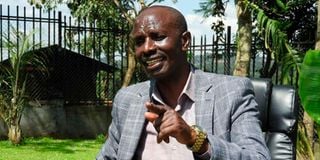Premium
Spare Sossion the flak, plan to boost unionism

Former Knut Secretary-General Wilson Sossion.
It seems daylight has broken for Kenya National Union of Teachers (Knut) following the departure of its erstwhile secretary-general, Wilson Sossion. Indeed, no other Knut leader has ever crossed the government’s way as much as he did.
And it’s not just government but the general public as well. Many parents would sulk upon seeing Mr Sossion’s face on the television, for they had come to associate him with teachers’ strikes. To parents, children are better off at school, for this leaves them with ample time to run their errands.
Regardless, Sossion was one unionist of his kind. As one who understands education issues well, he articulated them with unmatched precision. Knut will miss out on this. And he would face the government fearlessly to express what he believed in.
A case in point is the Competency-Based Curriculum (CBC) rollout, which the government did with neither a legal framework nor proper public participation. Sessional Paper No. 1 of 2019 would be fronted hurriedly and a public conference organised in August the same year in a bid to cure the mishap.
Existential threat
Instructively, no government brooks dissent. They seek self-preservation ahead of anything else, hence view trade unions as an existential threat. As such, they take the earliest opportunity to vanquish any that seems overbearing. In 1928, about 300 banana workers were shot dead while rallying for better working conditions in Columbia; 34 would similarly die in 2018, according to the ILO. That’s why Knut’s woes may not end with Sossion’s exit.
Unions shouldn’t be understood in the narrow sense of agitating for higher pay only but as voices for the voiceless and champions for human rights, which would otherwise be violated by rogue employers.
Their other purposes include assessing members’ occupational needs, arbitrating disputes between employees and employers, advocating better work environments, educating members about their responsibilities and guarding human and democratic rights, which contribute to job satisfaction, consequently enhancing service delivery.
Settling conflicts
In Germany and France, for instance, ILO reports that unions have played a major role in settling industrial and political conflicts. The mining industry in South Africa provides other valuable examples. Many employers bar their workers from joining unions, to maintain a stranglehold over them.
Unions must be cautious when dealing with governments. The new Knut leadership should never be deluded of the task ahead. As defenders of workers’ welfare, they must be ready to serve the teacher first and ensure that discontent is resolved using the best available alternatives.
Whereas they promised to end strikes — which have, unfortunately, come to characterise teachers in this country — they must inquire into why such were necessary.
The education sector is very sensitive; teacher unions must keep their eyes on the ball, especially during this curriculum transition period. There are many issues that aren’t clear about CBC and stakeholders must unite to ensure it bears fruit, which will only manifest in the success of the children.





